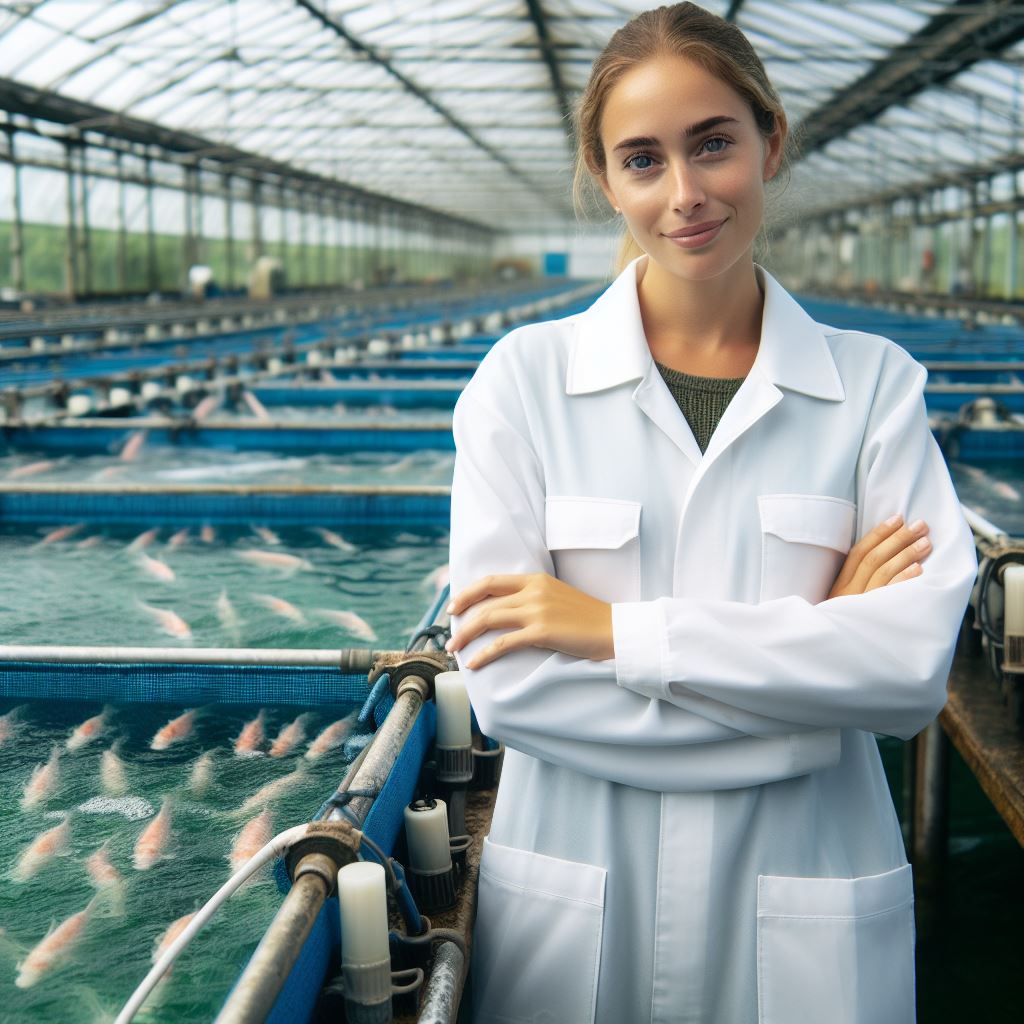Introduction
Aquaculture law in the UK is crucial for governing the regulations in the aquaculture industry, ensuring its sustainability.
In this blog post, we will delve into the importance of these regulations and explore the various aspects they cover.
Why are regulations important in the aquaculture industry?
Regulations play a vital role in maintaining the environmental sustainability and ethical practices in the aquaculture sector. They ensure the protection of aquatic ecosystems, fish welfare, and food safety.
We will discuss the key UK regulations governing aquaculture, including licensing requirements, environmental impact assessments, and site selection criteria.
We will explore the regulations related to fish health and welfare, biosecurity, and food labeling.
- Licensing requirements: We will delve into the process of obtaining aquaculture licenses, including the application process, conditions, and compliance standards.
- Environmental impact assessments: We will explore conducting environmental impact assessments and the criteria to assess and minimize aquaculture operations’ impact.
- Site selection criteria: We will discuss the factors that influence the selection of suitable aquaculture sites, such as water quality, proximity to sensitive areas, and social considerations.
- Fish health and welfare: We will examine regulations on fish health, disease prevention, and welfare standards, actively addressing their management.
- Biosecurity: We will explain the measures required to prevent the introduction and spread of diseases within aquaculture facilities.
- Food labeling: We will touch upon the regulations governing accurate labeling of aquaculture products to ensure consumer transparency and safety.
By understanding and complying with these regulations, the aquaculture industry in the UK can continue to thrive sustainably while maintaining high standards of fish welfare and environmental protection.
Overview of Aquaculture Law
Define aquaculture and its significance in the UK
Aquaculture is the practice of cultivating aquatic organisms for food, conservation, and restoration purposes.
It plays a significant role in the UK, contributing to the economy and ensuring a sustainable food supply.
Regulations in the aquaculture sector
Regulations are necessary in the aquaculture sector to ensure environmental protection, public health, and sustainable practices.
History of aquaculture law in the UK
In the 1800s, the UK established regulations for fisheries management, preventing overfishing and ensuring sustainability. Over time, the focus expanded to include aquaculture and water quality.
In the 20th century, aquaculture management became a priority. Today, comprehensive UK regulations cover aquaculture at national and European levels.
The Aquaculture Regulation Directorate enforces these regulations.
The Aquaculture and Fisheries Act is a key regulation, legally licensing aquaculture operators. It promotes responsible practices and sets standards.
Operators need a detailed license, specifying species and location, ensuring environmentally responsible practices. The license prevents disease spread and protects aquatic organisms.
Personalized UK Career Consulting
Receive tailored career guidance designed just for you. Get actionable steps and expert support to boost your career in 1-3 days. Take control of your career now.
Get StartedEnvironmental impact assessments precede license approval, identifying and mitigating risks. Assessments consider water quality, biodiversity, and interactions with wild species.
Consumer protection regulations govern veterinary medicine use in aquaculture, ensuring approved substances and compliance through inspections and testing.
The UK actively engages in international efforts to promote sustainable aquaculture, collaborating and sharing knowledge.
The robust legal framework promotes UK aquaculture sustainability, contributing to the economy and food security.
Key UK Regulations in Aquaculture Law
Main Legislative Framework Governing Aquaculture in the UK
Aquaculture in the UK is governed by various legislations and regulations to ensure sustainable practices.
The primary legislative framework for aquaculture in the UK is the Aquaculture Regulations 2010.
These regulations provide a comprehensive set of rules and standards that must be followed by aquaculture operators.
Included in the framework are provisions regarding site selection, fish health, environmental protection, and waste management.
Compliance with these regulations is essential for the sustainable development of the aquaculture sector in the UK.
The Role of the Aquaculture Regulation Team in Enforcing Regulations
The Aquaculture Regulation Team (ART) is responsible for enforcing the regulations and ensuring compliance.
The team consists of skilled professionals who monitor and inspect aquaculture facilities regularly.
Their role is to assess compliance with the Aquaculture Regulations 2010 and other relevant legislation.
ART works closely with aquaculture operators to provide guidance and support in meeting regulatory requirements.
Enforcement actions are taken when necessary to address non-compliance and maintain a level playing field.
Your Dream Job Starts with a Perfect CV
Get a tailored CV and cover letter that captures your unique strengths and stands out in your industry. Let us help you make an unforgettable first impression.
Get StartedThe Importance of Environmental Permits in Aquaculture Operations
Environmental permits play a crucial role in ensuring that aquaculture operations are carried out sustainably.
Operators must obtain permits from the relevant environmental agencies before commencing their activities.
These permits are granted based on a thorough assessment of the proposed site, its environmental impact, and mitigation measures.
Permits include conditions related to waste management, water quality monitoring, and protection of local ecosystems.
Strict compliance with these permits is crucial to safeguarding the environment and maintaining the health of aquatic ecosystems.
Specific Regulations Related to Fish Farming, Shellfish Cultivation, and other Aquaculture Activities
Different regulations apply to specific types of aquaculture activities such as fish farming and shellfish cultivation.
Fish farming regulations cover areas such as fish health management, fish welfare, and the use of medicines.
Specific requirements exist for water quality, fish disease prevention, and aquaculture infrastructure.
Shellfish cultivation regulations focus on water quality standards, harvesting practices, and product safety.
Other types of aquaculture activities, such as seaweed and algae farming, also have specific regulations to ensure responsible practices.
The Aquaculture Regulations 2010 form the main legislative framework governing aquaculture in the UK.
The Aquaculture Regulation Team plays a vital role in enforcing these regulations and supporting operators.
Environmental permits are essential for sustainable aquaculture operations, taking into account environmental impacts.
Specific regulations exist for fish farming, shellfish cultivation, and other types of aquaculture activities to ensure responsible practices.
Read: UK Aquaculture: Salary & Career Outlook 2024
Optimize Your LinkedIn for Success
Boost your LinkedIn profile with a professional bio, keyword-rich headline, and strategic recommendations that attract recruiters. Stand out from the crowd and get noticed.
Optimize NowEnvironmental Considerations in Aquaculture Law
Impacts of Aquaculture and the Need for Sustainability
- Aquaculture can have negative effects on the environment, including water pollution and habitat degradation.
- Ensuring sustainability in aquaculture is crucial to minimize these impacts and protect ecosystems.
The Regulations in Place to Protect Water Quality and Biodiversity
- The UK has specific regulations governing aquaculture to safeguard water quality and biodiversity.
- These regulations include limits on the discharge of pollutants, monitoring of water quality, and protection of wildlife habitats.
The Role of Environmental Impact Assessments in Aquaculture Projects
- Environmental impact assessments (EIAs) are a crucial part of aquaculture projects.
- EIAs identify potential environmental risks and ensure mitigation measures are put in place to minimize negative impacts.
The Regulations Related to Waste Management and Disease Control in Aquaculture Operations
- Proper waste management is essential in aquaculture operations to prevent water pollution and habitat destruction.
- UK regulations require the implementation of waste management plans and the use of best practices for disease control.
List of Relevant Regulations
- Water Resources Act 1991 – regulates the discharge of pollutants from aquaculture facilities into water bodies.
- Habitats Regulations 2017 – protects habitats for wildlife, including those impacted by aquaculture operations.
- Environmental Impact Assessment (EIA) Regulations 2017 – mandates the assessment of potential environmental impacts before aquaculture projects.
- Waste Management Licensing Regulations 1994 – governs the management and disposal of waste from aquaculture operations.
- Disease Control Orders – certain diseases can affect aquaculture, and these orders provide regulations for disease control, prevention, and reporting.
Aquaculture law in the UK emphasizes the need to consider environmental impacts and ensure sustainability in the industry.
The regulations in place protect water quality, biodiversity, and wildlife habitats. Environmental impact assessments play a vital role in identifying and mitigating potential risks.
Waste management and disease control regulations further contribute to the long-term sustainability of aquaculture operations.
By adhering to these regulations, the aquaculture industry can thrive while minimizing its environmental footprint.
Read: Top 5 Challenges for UK Aquaculture Techs

Discover More: UK Agricultural Laws: A Manager’s Overview
Licensing and Compliance in Aquaculture Law
Aquaculture operations in the UK
Aquaculture operations in the UK are required to obtain a license from the appropriate regulatory body.
\The licensing requirements differ depending on the type and scale of the operation.
Applicants must submit detailed plans and evidence of their ability to comply with regulations.
The regulatory body assesses the application, considering environmental, social, and economic impacts.
Licenses may include conditions for monitoring and reporting, waste management, and fish health management.
Regular inspections are conducted to ensure compliance with the terms and conditions of the license.
Licensees are required to keep records and provide information to the regulatory body upon request.
The importance of complying with regulations to ensure sustainability
Compliance with regulations is crucial for the long-term sustainability of aquaculture operations.
Regulations aim to protect the environment, preserve biodiversity, and promote responsible fish farming practices.
By complying with regulations, aquaculture operators minimize negative impacts on ecosystems and surrounding communities.
Adhering to regulations ensures the well-being of farmed fish, thus maintaining their health and quality.
Compliance also builds public trust and confidence in the industry, benefiting both businesses and consumers.
Failure to comply with regulations can result in reputational damage, financial losses, and legal consequences.
Penalties for non-compliance and the enforcement measures in place
Non-compliance with aquaculture regulations can lead to severe penalties and enforcement measures.
Penalties for non-compliance may include fines, suspension or revocation of licenses, and criminal charges.
The regulatory body has the authority to impose administrative sanctions and injunctive relief on non-compliant operations.
Repeat offenders may face stricter penalties, including imprisonment and additional financial repercussions.
Enforcement measures also include site closures, seizure of equipment, and remedial action requirements.
Inspections, audits, and investigations are carried out by the regulatory body to ensure compliance and deter non-compliance.
Whistleblower programs encourage reporting of non-compliant activities, enhancing enforcement efforts.
Aquaculture operations in the UK are required to obtain licenses and comply with regulations.
Compliance ensures sustainable practices, protects the environment, and maintains the health of farmed fish.
Penalties for non-compliance can be severe, including fines, license suspension, and criminal charges.
Enforcement measures such as inspections and audits are in place to promote compliance and deter non-compliance.
By understanding and adhering to licensing and compliance requirements, aquaculture operators contribute to a thriving and responsible industry.
Read: Aquaculture in the UK: Education Pathways
Find Out More: Urban Forestry: The Future in Cities
Future Trends and Developments in Aquaculture Law
Aquaculture, or the farming of aquatic organisms, has emerged as one of the fastest-growing sectors in the agriculture industry.
As this industry continues to expand, there is a pressing need for comprehensive regulations to ensure sustainable practices and protect the environment.
In the United Kingdom, aquaculture law plays a crucial role in governing these operations.
In this blog sections, we will explore the potential changes, emerging issues, challenges, and ongoing initiatives in aquaculture law in the UK.
Potential Changes in Aquaculture Regulations in the UK
- The UK government might introduce stricter regulations to enhance biosecurity measures in aquaculture facilities.
- There could be a revision of existing licensing processes to foster innovation and streamline administrative procedures.
- New guidelines may be developed to address the potential impacts of climate change on aquaculture operations.
- The government may consider establishing clearer protocols for managing disease outbreaks to mitigate risks to both farmed and wild aquatic species.
- There could be an increased focus on diversifying aquaculture species to reduce reliance on a few dominant species.
Emerging Issues and Challenges in the Industry
- Escapes of farmed fish and their potential interbreeding with wild populations pose ecological and genetic risks.
- The use of antibiotics and other chemicals in aquaculture raises concerns about the development of antimicrobial resistance.
- Environmental impacts, such as nutrient pollution and habitat alteration, need to be addressed to maintain ecosystem integrity.
- Consumer confidence in the sustainability and safety of farmed seafood remains a challenge for the aquaculture industry.
- The industry must navigate complex international trade agreements and find opportunities for growth in a post-Brexit era.
Ongoing Initiatives to Promote Sustainable Aquaculture Practices
- The UK Aquaculture Regulation Advisory Scheme (UK ARAS) works to provide guidance on compliance with existing regulations.
- Organizations like the Sustainable Aquaculture Innovation Centre (SAIC) support research and development in sustainable aquaculture practices.
- The Aquaculture Stewardship Council (ASC) certifies responsible aquaculture operations, fostering consumer trust and market access.
- Efforts are being made to enhance collaboration between regulators, industry stakeholders, and environmental groups to develop effective management strategies.
- Researchers explore satellite monitoring and fish health sensors for active disease prevention and monitoring improvement.
The future of aquaculture law in the UK holds several potential changes, along with emerging issues and challenges for the industry.
However, ongoing initiatives aimed at promoting sustainable practices provide hope for the continued growth and development of this vital sector.
As aquaculture continues to evolve, it is essential for regulators and industry players to adapt and collaborate to ensure the long-term sustainability of this important industry.
Read: Sustainable Practices in UK Aquaculture Tech
Conclusion
The UK has implemented regulations to ensure the sustainable development of aquaculture.
These regulations aim to protect the environment, maintain high standards of fish welfare, and promote the production of safe and healthy seafood.
Aquaculture regulations play a crucial role in the growth and success of the aquaculture industry in the UK.
They provide a framework that encourages responsible practices, prevents the spread of diseases, and safeguards the long-term viability of the sector.
Aquaculture participants, such as farmers, fisheries, and consumers, must actively stay informed about changes in aquaculture law.
Regularly checking for new regulations and guidelines will help ensure compliance with the law and contribute to the sustainability and integrity of the industry.
By staying aware and engaged, individuals can actively participate in shaping the future of aquaculture regulation and contribute to the continued growth and success of the industry in the UK.
Being knowledgeable about the regulations will also help consumers make informed choices when purchasing seafood, supporting sustainable and responsible aquaculture practices.
[E-Book for Sale]
500 Cutting-Edge Tech Startup Ideas for 2024 & 2025: Innovate, Create, Dominate
$19.99 • 500 Tech Startup Ideas • 62 pages
You will get inspired with 500 innovative tech startup ideas for 2024 and 2025, complete with concise descriptions to help you kickstart your entrepreneurial journey in AI, Blockchain, IoT, Fintech, and AR/VR.




